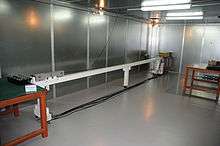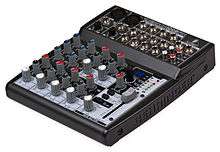Behringer
Behringer is an audio equipment company founded by the Swiss engineer Uli Behringer on January 25, 1989, in Willich, Germany. Behringer was listed as the 14th largest manufacturer of music products in 2007.[3] Behringer is a multinational group of companies, with direct marketing presence in 10 countries or territories and a sales network in over 130 countries around the world. Though originally a German manufacturer, the company now makes its products in China.
 | |
| Private | |
| Genre | Audio equipment |
| Founded | Germany (January 25, 1989) |
| Founder | Uli Behringer[1] |
| Headquarters | , |
Area served | Worldwide |
Key people | Uli Behringer (Founder and CEO) [2] |
| Products | Audio and lighting equipment, musical instruments |
Number of employees | 3500 |
| Parent | Music Tribe |
| Website | www |
The company is owned by Music Tribe, a holding company also founded and chaired by Uli Behringer, and currently based in the tax haven British Virgin Islands. It also owns other audio companies such as Midas, Klark Teknik and Bugera,[4] as well as Electronic Manufacturing Services company Eurotec. In June 2012, Music Group also acquired Turbosound company, which designs and manufactures professional loudspeaker systems and was formerly owned by Harman.[5][6]
History
1989–2001: Foundation and early development
Uli Behringer, the company's founder, was committed to music and technology from a very early age, and had constructed a synthesizer (the UB-1) by the age of 16.[1]
While studying sound engineering and classical piano at the Robert Schumann conservatory in Düsseldorf, Behringer found the university had limited equipment for student use, so he started to build his own products. His fellow students requested equipment from him too, and soon he was receiving more orders than he could handle himself, leading to the creation of Behringer Inc.[1] In the early days, Behringer focused on studio audio processors such as noise reduction systems and compressors,[1] but the product line soon included guitar amps, PA amplifiers and loudspeakers, mixing boards, stompboxes, recording interfaces, microphones, digital pianos, guitars, lighting equipment, etc. The appeal of Behringer's products was the package of performance and low price.[7]
While Behringer products were manufactured in Willich, Germany, many of the individual components were imported from mainland China. In 1990, to lower production costs, Behringer shifted production from West Germany to mainland China. Initially, subcontractors were engaged to produce the equipment. By 1997, Uli Behringer had relocated to Hong Kong in an effort to supervise manufacturing quality and to better understand Chinese culture.[8][9]
Ear logo

According to Uli Behringer his piano teacher, impressed with his sense of perfect pitch, nicknamed him "The Ear", the inspiration for the Behringer Ear logo. The highlighted "ING" stands for "diploma engineer", or the German academic title "Dipl.-Ing", which he received upon his graduation from the Fachhochschule Düsseldorf.[10][11]
The logo was updated to the current logo in September 2010.[12]
CoolAudio acquisition
In May 2000, Behringer acquired the rights to the entire CoolAudio technology from Intersil Corporation, a US-based semi-conductor manufacturer specializing in integrated circuits for audio applications. The acquisition included an extensive intellectual property portfolio and licensees such as Alpine and Rowe, among others.[13]
2002–2007: Behringer City
In 2002, Behringer completed its own factory, Behringer City, in Zhongshan of China's Guangdong province after it consolidated more than ten separate production locations into one vertically integrated plant. Comprising eight buildings that produces electronics, speakers, guitars and digital pianos and also hosts an onsite health clinic.[7] This strategy was different than that taken by other musical instrument companies who used third party manufacturers. Choosing to run a self-contained plant allowed Behringer a greater level of quality control.[7] The 1,200,000-square-foot (110,000 m2) manufacturing complex in Zhongshan ships more than 2.5 million Behringer products per year to markets around the globe. The plant turns out over 50,000 mixers per month.
Behringer University
Inspired by lean manufacturing, and driven by the Kaizen philosophy of continual improvement,[9] Behringer makes efforts to help its employees to improve. "Behringer University" supplies employees with training resources and E-learning courses to hone their career skills within the company. This project includes classes for management, career planning, health, language, and general knowledge.[1][9]
Awards
In 2008, Uli Behringer was one of 60 finalists in "Entrepreneur of the Year" by Ernst & Young of Germany.[14]
In 2016, Uli Behringer received the award "Global Audio Industry Leader in recognition of his visionary leadership in creating and strengthening the International MUSIC" [15]
Developments
FCC dispute


In February 2006, the US Federal Communications Commission (FCC) fined Behringer $1M,[14] issuing a Notice of Apparent Liability against Behringer, claiming that 50 of the company's products had not been tested for conducted and radiated emissions limits as required by US law,[15] and noting that Behringer continued to sell the products for a year after being notified.[14] Behringer had believed that since the units had passed stringent European CE standards, they would also comply with FCC verification requirements.[14] According to Behringer, it had overlooked the differences in testing standards and procedures under FCC and European requirements and has since implemented a complete UL certified safety and EMC testing laboratory under the UL certified witness program, including an in-house audit and global regulatory review system.[16]
Legal cases
In June 1997, Mackie accused Behringer of trademark and trade dress infringement, and brought suit seeking $327M in damages[17][18] but such claims were later rejected by the court. In their suit, Mackie said that Behringer had a history of copying products by other manufacturers and selling them as their own.[19] The Mackie suit detailed an instance, in which Behringer was sued by Aphex Systems for copying the Aural Exciter Type F—in that case Aphex Systems won 690,000 Deutsche Mark.[19] The Mackie suit also mentioned similar cases filed by BBE, dbx and Drawmer.[19] On 30 November 1999, the U.S. District Court in Seattle, Washington, dismissed Mackie claims that Behringer had infringed on Mackie copyrights with its MX 8000 mixer, noting that circuit schematics are not covered by copyright laws.[20][21][22]
In 2005, Roland Corporation sued to enforce Roland's trade dress, trademark, and other intellectual property rights with regard to Behringer's recently released guitar pedals.[23] The two companies came to a confidential settlement in 2006 after Behringer changed their designs.[24]
In 2009 Peavey Electronics Corp. filed two lawsuits against various companies under Behringer/Music Group umbrella for patent infringement, federal and common law trademark infringement, false designation of origin, trademark dilution and unfair competition.[25] In 2011 The Music Group filed a lawsuit against Peavey for "false advertising, false patent marking and unfair competition".[26]
In 2018, Behringer/Music Tribe attempted to file a libel suit against Dave Smith Instruments (now Sequential) and 20 anonymous forum users for making what it referred to as "false, defamatory and libelous" remarks about its clones of synthesizers such as the Minimoog, Oberheim OB-Xa, and Sequential Pro-One. Although the lawsuit was directed mainly at the forum users, DSI was involved because an engineer who worked for them was a participant in the discussions. The lawsuits were dismissed[27] after the defendants filed a motion under California's anti-SLAPP statute.[28]
"Kirn CorkSniffer"
In March 2020, Behringer published a mock video for a synthesizer, the "KIRN CorkSniffer", which appeared to mock music technology journalist and synthesiser developer Peter Kirn. The video received extensive criticism and accusations of using antisemitic imagery. Company founder Uli Behringer issued an apology on Facebook, saying the video had been intended as "pure satire by our marketing department".[29] The apology was deleted the following day.[30]
See also
- List of microphone manufacturers
- List of studio monitor manufacturers
- Synthesizer clone
References
- "The Behringer Story". Behringer. Archived from the original on 25 September 2009. Retrieved 29 December 2009.
- "BEHRINGER: Movers and Shakers". behringer.com. Archived from the original on 20 July 2011. Retrieved 3 October 2010.
- The Music Trades, December 2008
- Prown, Pete (February 2012). "Hail-able: The Bugera 212V-BK". Vintage Guitar.
- "MUSIC Group". music-group.com. Archived from the original on 14 July 2011. Retrieved 20 September 2010.
- "Behringer's Music Group acquires Midas and Klark Teknik". pro-music-news.com. Retrieved 20 September 2010.
- "Behringer turns 20: aggressive music & audio manufacturer marks two decades of growth with a vertically integrated manufacturing". The Music Trades. April 2009. Retrieved 29 December 2009.
- Music Trades, Jan 2004
- The Music Trades, Nov 2008
- "A Musicians Life: Mr. Behringer". AMAZONA.de. 15 November 2009. Retrieved 23 October 2015.
- The Music Trades, 1 December 1992
- Sherry Lipp (24 September 2010). "New Logo, New Style…". behringer.com. Archived from the original on 8 October 2010. Retrieved 5 October 2010.
- "Behringer Acquires CoolAudio" (Press release). Behringer. 1 May 200. Retrieved 29 December 2009.
- Gearwire.com. 14 June 2007. "Behringer Fined One Million Dollars By FCC." Archived 17 October 2007 at the Wayback Machine Retrieved on 4 October 2009.
- Radio Currents Online, 20–26 February 2006 Archived 16 February 2009 at the Wayback Machine
- "Behringer Resolved FCC Compliance Issues Before Recent Ruling". Musiciansnews.com. Archived from the original on 29 January 2013. Retrieved 29 December 2009.
- Loud Technologies Inc. LTec Quarterly Report (10-Q) Item 1. Legal Proceedings Archived 25 January 2008 at the Wayback Machine
- Mackie Designs Inc. files lawsuit to stop "knockoff" products; Company seeks damages of $327 million | Business Wire | Find Articles at Bnet.com
- Verna, Paul. Billboard, 5 July 1997. "Mackie Sues Over Knockoffs: Behringer, Sam Ash Are Defendants." Retrieved 27 October 2009.
- "Mackie/Behringer lawsuit. | [[The Music Trades]] | Find Articles at Bnet.com". Archived from the original on 16 December 2007. Retrieved 25 October 2007.
- The Music Trades, February 1999. Archived at Entrepreneur.com as "Mackie/Behringer Lawsuit." Retrieved on 8 September 2009.
- "Mackie Designs Inc v. Behringer Specialised studio equipment (UK) Ltd, Ulrich Bernhard Behringer & Behringer Spezielle Studiotechnik GmbH [1999] EWHC Ch 252 (22nd February, 1999)". Bailii.org. 23 April 1999. Retrieved 30 December 2011.
- Anonymous (8 March 2005). "Roland sues Behringer". Tom's Hardware Forum. Archived from the original on 19 July 2011. Retrieved 29 December 2009.
- "Behringer and Roland Settle Lawsuit". 10 April 2006. Archived from the original on 19 July 2009. Retrieved 29 December 2009.
- "Peavey Files Lawsuits Against Behringer, Intellectual property issues cited". Sonicstate.com. Retrieved 30 December 2011.
- Cooper, Gary. "Behringer's MUSIC group files US suit against Peavey". Musical instrument industry news. MI Pro. Archived from the original on 2 May 2011. Retrieved 30 December 2011.
- "Behringer attempts to sue Dave Smith Instruments and forum users for $250,000". Mixmag. Retrieved 7 April 2019.
- "Behringer sued Dave Smith Instruments, forum posters, and lost". CDM Create Digital Music. 19 June 2018. Retrieved 25 February 2019.
- March 2020, MusicRadar03. "Behringer forced to apologise after bullying row". MusicRadar. Retrieved 7 March 2020.
- March 2020, MusicRadar04. "Behringer deletes 'CorkSniffer' apology as Peter Kirn tells people not to smash up their synths". MusicRadar. Retrieved 7 March 2020.
External links
| Wikimedia Commons has media related to Behringer. |